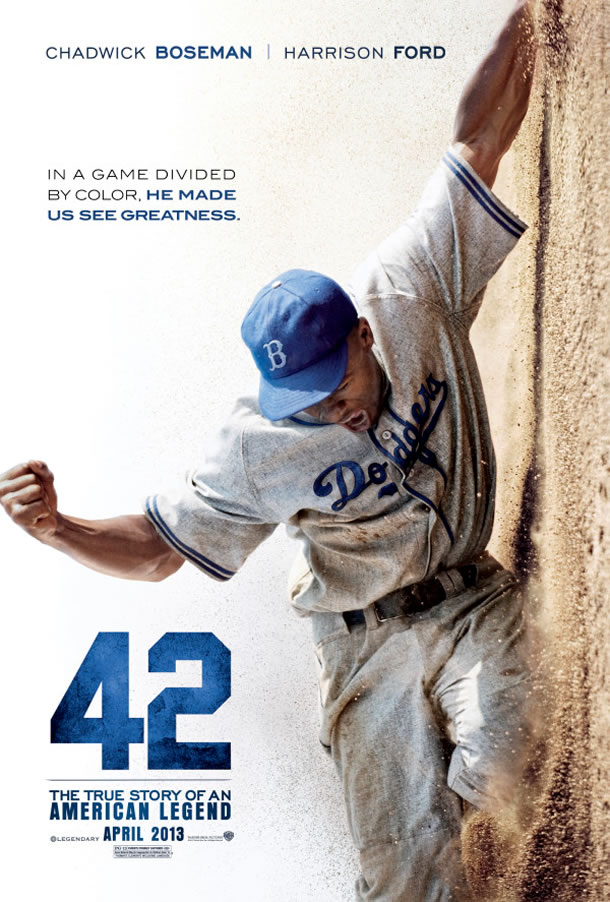 [Audio Version Below] Rarely does a cultural figure become a legend in their own time, but that’s Jackie Robinson. He’s only grown more mythic since. While not the greatest player to ever play a game, Robinson was undeniably a top-level athlete, the kind that needed nothing more than a chance to earn his stats on cold, unprejudiced paper. Once he did- that was it. This is the stuff of inspirational documentary, but creating a compelling narrative around such a story is much tougher- especially when we’re talking about the career of multi-sport professional athlete, soldier, and Baseball Hall of Famer, not to mention a civil rights icon. And even a good film about a person often becomes a bad film about baseball, as the exhaustingly long schedule and complicated context of the sport make it tough to pin everything on one dramatic moment as we so often like to see in movies.
[Audio Version Below] Rarely does a cultural figure become a legend in their own time, but that’s Jackie Robinson. He’s only grown more mythic since. While not the greatest player to ever play a game, Robinson was undeniably a top-level athlete, the kind that needed nothing more than a chance to earn his stats on cold, unprejudiced paper. Once he did- that was it. This is the stuff of inspirational documentary, but creating a compelling narrative around such a story is much tougher- especially when we’re talking about the career of multi-sport professional athlete, soldier, and Baseball Hall of Famer, not to mention a civil rights icon. And even a good film about a person often becomes a bad film about baseball, as the exhaustingly long schedule and complicated context of the sport make it tough to pin everything on one dramatic moment as we so often like to see in movies.
42 does not conquer all of these issues, but it wisely side-steps some and finds interesting solutions to others. Most of this success comes from frequent screenwriter and occasional director Brian Helgeland’s choice to make this a film about Jackie Robinson as a cultural force. Chadwick Boseman enters the picture as a Robinson that is already a successful, confident athlete and frequent agitator of segregationist society. He’s already a man with time invested in a relationship with a woman he marries just a few scenes into this picture. With the hindsight of history and the inherent drama that comes with the movie, you know, being about him, he’s already a man with a destiny . We also know this because the film tells us this explicitly in a montage that acts as a prologue. It’s a corny, trite biopic start, but it actually sets a tone and serves a function with a hidden sophistication…
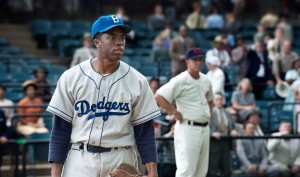 Where we begin in earnest though, is in the office of Dodger’s owner Branch Rickey. Played by Harrison Ford, Rickey brings out the best in a actor that hasn’t seemed present in a good long time. Here he is armed with at least some historical backing to make Rickey a gravelly, showman of a character- one loaded with great quips delivered with the kind of biblical drama you can pull off when you’re portraying people on the right side of history. “He’s coming,” he says, referring to the black player that is going to change the baseball. Rickey has made a decision that the time has come for things to change. It is now an inevitability. The conflict comes from finding the rock-solid man that can not just brave abuse, but brave it for as long as it will be dished out. Enter Jackie Robinson.
Where we begin in earnest though, is in the office of Dodger’s owner Branch Rickey. Played by Harrison Ford, Rickey brings out the best in a actor that hasn’t seemed present in a good long time. Here he is armed with at least some historical backing to make Rickey a gravelly, showman of a character- one loaded with great quips delivered with the kind of biblical drama you can pull off when you’re portraying people on the right side of history. “He’s coming,” he says, referring to the black player that is going to change the baseball. Rickey has made a decision that the time has come for things to change. It is now an inevitability. The conflict comes from finding the rock-solid man that can not just brave abuse, but brave it for as long as it will be dished out. Enter Jackie Robinson.
The Jackie Robinson we meet does not need to be taught control- he already understands the power of calm, deliberate confrontation. In his very first scene we watch him quietly teach a racist a lesson not through his heart, but through his wallet. We watch a backwoods white guy greet and pump gas for a bus of Negro League players, including Jackie, with perfect friendliness and civility, only breaking into the expected nastiness when Robinson approaches the bathroom. Here the attendant puts his foot down with statement, “you know you can’t go in there.” This is a small moment that speaks volumes about a lot of what we will come to see- people who are upholding institutions out of lazy, ignorant habit rather than passionate hatefulness. When faced with the choice of maintaining the integrity of his dilapidated backwood toilet or actually making a 99-gallon sale, you can imagine how quickly segregation disappears in that scenario.
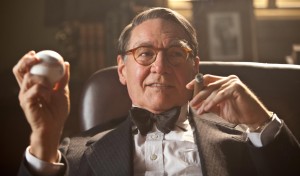 This is what 42 is really about- the moment that came in Baseball when the dollar finally spoke louder than tradition and people were forced to show their true colors once the change was made.
This is what 42 is really about- the moment that came in Baseball when the dollar finally spoke louder than tradition and people were forced to show their true colors once the change was made.
As Robinson enters the international league to be groomed for the Dodgers and then eventually makes it onto Brooklyn’s roster, the film travels along through almost anecdotal sequences in which different character face the changing tide in different ways. Casual racists become ardent defendors merely by virtue of actually being around a person different from them. Hateful, virulent racists find themselves silent when their bluster proves too costly. Silent supporters become brave, outspoken advocates when presented with real ugliness. 42 is a film about degrees of change, about society’s bellcurve moving over the line into, at least, civility, even though some go farther than others and many must be dragged there by their pursestrings. It’s about what happens when a culture reaches that exact moment when the wave breaks and outdated ideas start to wash away.
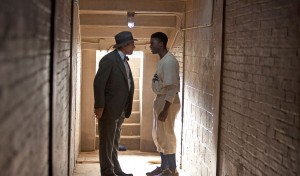 This is not to say the man at the center of it all is just a walking statue of justice. Boseman puts blood in Robinson’s veins and the trademark bounce in his lead-off steps in those moments before he steals second base. Neither the displays of athleticism nor the challenge of capturing Robinson’s distinct cool prove too much for Boseman, and he finds dimension that script doesn’t necessarily offer. It’s not easy being an agent of change around which everyone else is having their great dramatic self-revelations. And while Robinson requires no fundamental change of character –that is why he was the man for this moment– he does have things to learn about seeing the bigger picture.
This is not to say the man at the center of it all is just a walking statue of justice. Boseman puts blood in Robinson’s veins and the trademark bounce in his lead-off steps in those moments before he steals second base. Neither the displays of athleticism nor the challenge of capturing Robinson’s distinct cool prove too much for Boseman, and he finds dimension that script doesn’t necessarily offer. It’s not easy being an agent of change around which everyone else is having their great dramatic self-revelations. And while Robinson requires no fundamental change of character –that is why he was the man for this moment– he does have things to learn about seeing the bigger picture.
Scenes that Boseman shares with Ford consistently crackle- the father-figure dynamic is rich enough that it transcends the corniness, and avoids the pitfall of the magical old white man seeming to save the black people with his infinitely kind soul. Rickey is portrayed as a man who stood to benefit a great deal from doing the right thing –a fact that was true for any number of baseball managers– but the film lands on the conclusion that a distinct sense of duty led him to actually being the one to do so. Seeing the results on a person-to-person level provides a nice contrast and follow-up to the purely symbolic, legislative triumph of justice in last year’s Lincoln.
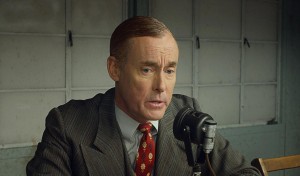 The film is full of great character actors that pop in for special turns- guys like John C. McGinly and Christopher Meloni that most know as “TV guys” but will always class up a film. Alan Tudyk does the same, though in a role that is going to stick with him for a long time- he’s got a lot of “hey, you’re the racist coach from 42!” in front of him. Nicole Beharie takes on the one significant female role in the film as Robinson’s wife Rachel, playing the quiet rock from which Robinson took strength. Expect a lot of comparisons between the current First Couple and the Robinsons as seen here.
The film is full of great character actors that pop in for special turns- guys like John C. McGinly and Christopher Meloni that most know as “TV guys” but will always class up a film. Alan Tudyk does the same, though in a role that is going to stick with him for a long time- he’s got a lot of “hey, you’re the racist coach from 42!” in front of him. Nicole Beharie takes on the one significant female role in the film as Robinson’s wife Rachel, playing the quiet rock from which Robinson took strength. Expect a lot of comparisons between the current First Couple and the Robinsons as seen here.
When it comes to nuts and bolts filmmaking, Helgeland pretty much bunts on all levels- the directing is straightforward, the score stringy and manipulative, the script episodic and pocked by useless scenes, the period VFX frequent and obvious, the pacing breathy. Helgeland and his team do open things up a little for the Baseball sequences, which do have some genuine pop and exhilaration to them. Here is where visual effects and modern camera tech allow them to get you deep into the game, slicing out the bits where Robinson’s triumphs and failures meant something bigger than just a run or a win. For a film that doesn’t experiment much from a mostly anonymous director, it’s here that 42 swims in some desperately needed style (seriously, 42 makes Remember The Titans look like a Spike Lee film). Granted, you can give Helgeland credit for keeping it tight and the focus on the  cultural ideas at hand, but a lot of opportunity for daring, interesting choices were left on the table, especially after being sold with such a rich trailer. This is to say he could have run off the chalk a little bit and this still would have become a staple of substitute-teacher days in public schools, as is inevitable now.
cultural ideas at hand, but a lot of opportunity for daring, interesting choices were left on the table, especially after being sold with such a rich trailer. This is to say he could have run off the chalk a little bit and this still would have become a staple of substitute-teacher days in public schools, as is inevitable now.
It’s an important victory for 42 to have nailed the big ideas- it’s a great film about the many shades of bravery. It falls flat as a building narrative, but when each anecdote is so compelling it’s fair to ask how much that even matters. Scene for scene the film earns the swelling triumph and bittersweet laughs, a weepy score notwithstanding. Its general approach to the idea of institutional racism and the effect Robinson had on American culture is stellar, and Harrison Ford’s is a spectacular presence throughout the movie. One wonders what the more imaginative, expressive version of this film would look like in the hands of a more aggressive filmmaker, but the polished effort is worthy enough of the one number in all of professional athletics that has been retired by its entire sport. Undoubtedly, Robinson is a towering figure whose story deserves to be seen on the biggest screen possible. 42 is not the perfect version of that story, but it’s a good enough bunt that Robinson and his story’s inherent appeal can steal home.
Rating: 




Out of a Possible 5 Stars
AUDIO VERSION: